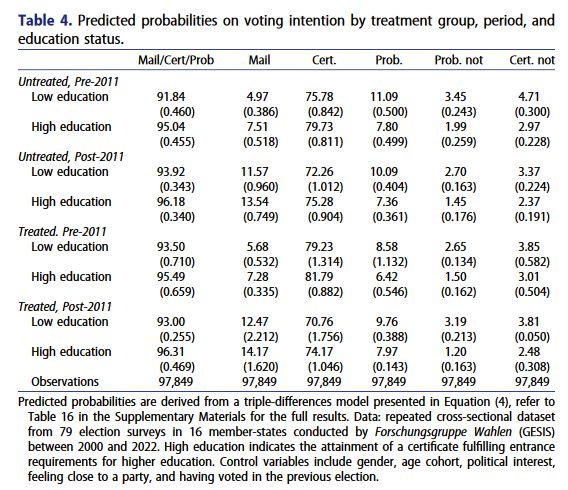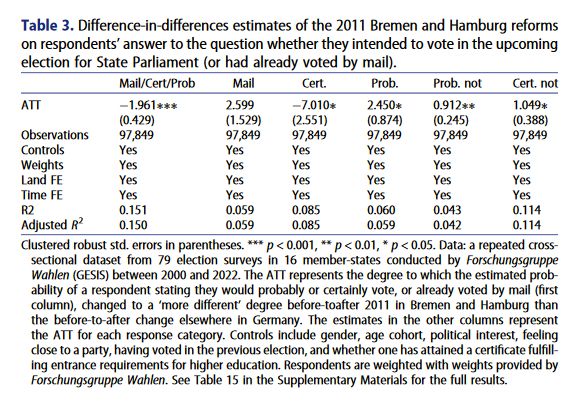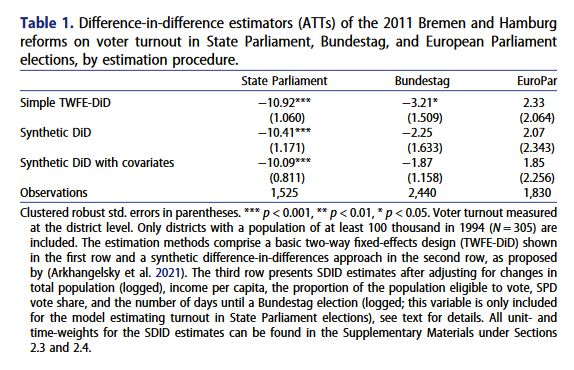Victor Ellenbroek
@vicellenbroek.bsky.social
PhD researcher European University Institute
NKO shows that most Dutch voters are fine with their second (or third) choices, that’s why everyone decides so late
October 31, 2025 at 6:59 PM
NKO shows that most Dutch voters are fine with their second (or third) choices, that’s why everyone decides so late
Voters would presumably understand this and adjust their vote accordingly? Like in Sweden
October 31, 2025 at 3:40 PM
Voters would presumably understand this and adjust their vote accordingly? Like in Sweden
Thanks Jack! My pleasure; I can share 50 free downloads. www.tandfonline.com/eprint/HZIAE... Feel free to reach out
March 15, 2024 at 5:57 AM
Thanks Jack! My pleasure; I can share 50 free downloads. www.tandfonline.com/eprint/HZIAE... Feel free to reach out
I also find that the reforms increased the participation gap between citizens with higher and lower levels of education. The lower-educated in Bremen and Hamburg were less likely to participate after 2011 compared to before, while lower educated elsewhere were more likely to turn out.

March 14, 2024 at 1:50 PM
I also find that the reforms increased the participation gap between citizens with higher and lower levels of education. The lower-educated in Bremen and Hamburg were less likely to participate after 2011 compared to before, while lower educated elsewhere were more likely to turn out.
Moreover, I used data from 79 election surveys to compare 97,849 observations. I find a significant and negative disparity between the change in voting intention among respondents from Bremen and Hamburg before and after 2011 and the change observed among respondents from other member-states.

March 14, 2024 at 1:44 PM
Moreover, I used data from 79 election surveys to compare 97,849 observations. I find a significant and negative disparity between the change in voting intention among respondents from Bremen and Hamburg before and after 2011 and the change observed among respondents from other member-states.
I find no significant before-to-after-reform differences in voter turnout for the unreformed Bundestag and European Parliament elections, ruling out that something other than the reforms is causing Bremen and Hamburg voters to be less inclined to vote.

March 14, 2024 at 1:42 PM
I find no significant before-to-after-reform differences in voter turnout for the unreformed Bundestag and European Parliament elections, ruling out that something other than the reforms is causing Bremen and Hamburg voters to be less inclined to vote.
The results hold after weighting control units and periods and after adjusting for population changes, changes in the share of citizens eligible to vote, changes in the SPD's vote share, and differences in the number of days until a federal election.
March 14, 2024 at 1:40 PM
The results hold after weighting control units and periods and after adjusting for population changes, changes in the share of citizens eligible to vote, changes in the SPD's vote share, and differences in the number of days until a federal election.
Pre-reform voter turnout trends in Bremen and Hamburg were similar to those in 305 comparable, untreated German districts or cities. However, the before-to-after-2011 change in Bremen and Hamburg is at least ten percentage points lower than elsewhere.
March 14, 2024 at 1:40 PM
Pre-reform voter turnout trends in Bremen and Hamburg were similar to those in 305 comparable, untreated German districts or cities. However, the before-to-after-2011 change in Bremen and Hamburg is at least ten percentage points lower than elsewhere.
Despite extensive information campaigns, turnout reached historical lows below 60% after the system's implementation.
I find evidence for a causal relationship.
March 14, 2024 at 1:40 PM
Despite extensive information campaigns, turnout reached historical lows below 60% after the system's implementation.
I find evidence for a causal relationship.
But do these changes induce voters to turn out? "Turns out," not in Germany: Bremen and Hamburg changed the system for their State Parliaments in 2011. Before, voters had one vote, to vote for a party. Now, voters have multiple votes to distribute and accumulate over all parties or candidates.
March 14, 2024 at 1:39 PM
But do these changes induce voters to turn out? "Turns out," not in Germany: Bremen and Hamburg changed the system for their State Parliaments in 2011. Before, voters had one vote, to vote for a party. Now, voters have multiple votes to distribute and accumulate over all parties or candidates.
In recent decades, parties have changed how we vote: Increasingly, we vote for candidates, and these votes are also increasingly consequential in helping your favorite candidate pass the minimum number of votes required to win a seat.
March 14, 2024 at 1:39 PM
In recent decades, parties have changed how we vote: Increasingly, we vote for candidates, and these votes are also increasingly consequential in helping your favorite candidate pass the minimum number of votes required to win a seat.

